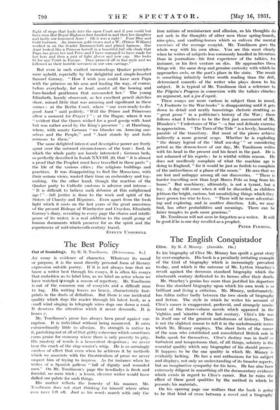P oli cy
The Best P l•cy
Out of Soundings. By H. M. Tomlinson. (Heinemann. Gs.).
AN essay is evidence of character. Whatever its mood or purpose, it is the most directly personal form of literary expression outside poetry. If it is not always true that we know a writer best through his essays, it is often his essays that embolden us to label him, as we label an actor whom we have watched tt.rough a season of repeitory. Mr. Tomlinson is out of the common run of essayists and a difficult man to tag. His writing leaves. no heavy, characteristic foot- prints in the dusts of definition. But there is one incidental quality which dogs the reader through his latest boOk, as a : mall wind singing in telegraph wires dogs one down a road. It deserves the attention which it never demands. It is hones y.
Mr. Tomlinson's prdse has always been proof against cor- ruption. It is individual without being mannered. It owes extraordinarily little to allusion. Its strength is native to it, partaking not at all of that gritty coherence which sometimes earns Praise for economy where there is only poverty to pity. His mastery of words is a benevolent despotism ; we never
hear the crack of the ring-master's whip. He is so seemingly careless of effect that even when he achieves it by methods
which we associate with the theatricalism of prose we never suspect him of trying to impress. As for instance when he writes of a Spanish galleon " full of dignity and wounded
men." On Mr. Tomlinson's page the hendiadys is fresh and forceful, no mere trick ; a leSser, cleverer writer would have dulled our palate for such things.
His matter reflects the honesty of his manner. Mr. Tomlinson does not start thinking for himself where other :men have left off. Just as his word march with only the iron rations of reminiscence and allusion, so his thoughts do not seek in the thoughts of other men those spring-boards, nine-pins, and vaulting-horses which so enliven the mental exercises of the average essayist. Mr. Tomlinson goes the whole way with his own ideas. You see this most clearly when he writes of subjects less commonly handled in literature than in journalism—bis first experience of the talkies, for instance, or his first venture on skis. He approaches these things wit the same deep and genuine curiosity with which he approaches owls, or the poet's place in the state. The result is something infinitely better worth reading than the deft, determined conceits of the writer who plays down to his subject. It is typical of Mr. Tomlinson that a reference to the Pilgrim's Progress in connexion with the talkies clinches an argument, not a jeu d'esprit.
These essays are more various in subject than in mood. "A Footnote to the War-books" is disappointing until it gets down to detail and neatly hamstrings rhetoric strutting as "great prose " in a politician's history of the War ; there follows what I believe to be the first just assessment of Mr. Blunden's " Undertones of War "—a fine and delicate exercise in appreciation. " The Turn of the Tide " is a lovely, haunting parable of the transitory. But most of the pieces achieve indirectly a more general scope. Whether he is exploding the dreary legend of the ' bluff sea-dog ' " or considering petrol as the demon-lover of our day, Mr. Tomlinson writes with his head in the present and his heart in the past. He is not ashamed of his regrets ; he is wistful within reason. He does not needlessly complain of what the machine age is doing to England, " for it would be just as foolish to complain of the untimeliness of a phase of the moon." He sees that we are lost and unhappy among all our discoveries. " There is harder travelling now than kept Marco Polo so long from his home." But machinery, ultimately, is not a tyrant, but a toy. A day will come when it will be discarded, as children jettison the bright, curious, but unsatisfying things which they have grown too wise to love. " There will be more adventur- ing and exploring, and in another direction. Life, we may find, has other probabilities and meanings. There can be fairer temples to gods more gracious."
Mr. Tomlinson will not soon be forgotten as a writer. It will be good if he is one day recalled as a prophet.
PETER FLEMING.


















































 Previous page
Previous page